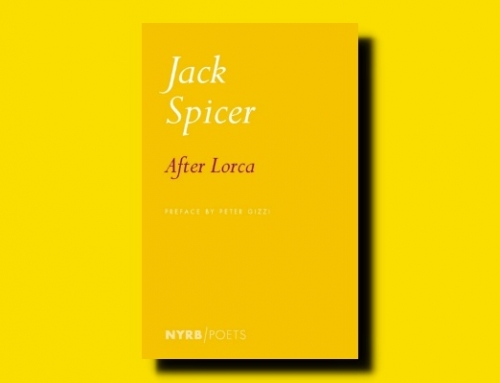
The Prime of Miss Jean Brodie
by Muriel Spark (1961)
Penguin (1985)
128 pp

I‘ve been casting glances across the room at Muriel Spark for some time now. Thanks to Bookmooch (more on the joys of reading this book used later), however, I found a nice copy of The Prime of Miss Jean Brodie (1961). It was first published in The New Yorker‘s October 16, 1961, issue, extending over 100 ad-plastered pages (I just found out that my subscription to The New Yorker gives full access to digital editions of all past issues — as if one doesn’t get enough for the $40).
When I picked up the book, I was a bit afraid I would be reading the inspiration for movies like Dead Poets Society or Mona Lisa Smile or any number of films and stories lauding an inspiring teacher. Perhaps Miss Brodie’s is a bit of an unconventional life, helping the students think outside of their roles. Happily (though I enjoyed Dead Poets Society), this was not the case.
Miss Brodie sees herself as the ideal teacher, approaching “education” from its original meaning: “to lead out.” She teaches her all-girl students about art and history and broaches the subject of sex, though mostly by allusion. Miss Brodie is unconventional, but she isn’t necessarily a beacon of light for her drifting students, known in the school as “the Brodie set.” She has sparked their imaginations, but perhaps not in the way intended.
After Miss Brodie tells the girls about her lover, killed in World War I, a few of the girls imagine Miss Brodie’s love life, writing melodramatic stories and expostulate on their growing awareness of sex. Their naïve perspective on sex is pleasantly comic (“He must have committed sex with his wife.”). In the girls’ lives, Miss Brodie becomes a looming personality. The thrill of the novel is in watching the girls grow older trying to work their way under her disturbing shadow. All becomes more complex when the girls discover Miss Brodie’s love triangle with two of the other teachers.
Though I found the book intriguing, I think I was distracted while reading it. I could sense the depth of psychological insight and I could capture some of the themes, but nothing came to life. I didn’t care about the characters, neither wishing them well or ill, though I enjoyed watching them interact in their terribly flawed lives. While the “why” was intriguing, neither the who nor what compelled me to keep reading.
This is not to say it wasn’t enjoyable. The details about the characters do make the characters come to life. As I mentioned above, some of Spark’s perceptive prose is very comical. Some of it is very sad. Here is an example of sadness. Early in the novel, we get a glimpse of one of the bullied girl’s grown-up life. Miss Brodie constantly picks on poor Mary, and things don’t get better for her.
On one occasion of real misery — when her first and last boy-friend, a corporal whom she had known for two weeks, deserted her by failing to turn up at an appointed place and failing to come near her again — she thought back to see if she had ever really been happy in her life . . . .
The narrative structure is another interesting aspect of the novella. Here, the narrator knows everything that has happened and that will happen to the characters. We get snippets of the future while we read about the past. For example, we know early on that one of the girls betrays Miss Brodie, causing her termination at the school. It does not take much longer before we find out which one did it. Much of the book is focused on why.
I promised to bring up Bookmooch, the online book swapping site I joined a couple of months ago to get rid of some of my old books while acquiring some others. Generally, I’m not thrilled with the results. Books I read still look new (and I get a lot of snarky comments about that, from jealous people obviously). Most of the books I got came to me in pretty terrible shape. Some are unreadable, frankly. This book, however, brought some unexpected joy. A prior owner had annotated it for me, marking every time fascism was brought up and linking it (I’m not sure quite how) to Hitler’s army. Sure, fascism plays a role in the book, but this person skipped over most everything else and made some flying leaps of inference. It added a nice bit of color to my time with Miss Brodie.
I’m fully aware that my misgivings with the novel can be summed up in one phrase: it’s just me. Thankfully, my wife, who is much more perceptive to female psychology than I, has also read the book — and she liked it, may have even started re-reading it. Hopefully she’ll make some comments spelling out some of the other intriguing aspects of the book and pointing out how many ways I missed the boat. I’m already shifting my attention to Memento Mori.








Muriel Spark, despite the brevity of her books and the simplicity of her language, can be a difficult writer. There is more than a sliver of ice in her heart, which is communicated to the reader by her disregard as to whether or not the reader cares for her characters: we’re not even sure she does. (The relationship between author and character is a subject of Spark’s first novel, The Comforters, which features a character who knows she’s in a novel.)
I do think Memento Mori is one of her more reader-friendly books, but I also think a better introduction to Spark is through her short stories.
That is encouraging, John. I both did and didn’t like Miss Brodie and felt the lesser reader for it. I look forward to getting to know her better. I think I’ll be able to warm up to her.
It is interesting that you should post this review on the same day John Self posted on Daphne DuMaurier’s short stories. I’ve always tended to regard the two as similiar — with no real justification beyond age and even then Spark is 10 years younger. Perhaps also the fact the I was introduced to both through their short stories and found those stories had a dated, period quality to them — not renecessarily a bad thing as, like this book, they do reflect the times.
I think something interesting to consider is why the girls were drawn to Miss Brodie. Particularly Mary. The headmistress was always trying to get in with the Brodie set, but was always unsuccessful. Yet Miss Brodie remained a part of their life even after she died. I think some of it was that she constantly was bringing up their potential, their chance to be the creme-de-la-creme. I think the bigger part was the need of the group. You can see this when Sandy considers being nice to Mary but doesn’t because it will threaten her own position. The whole group mentality she created really fascinated me.
I’d love to hear some of your insight on Sandy. Spark had some great prose on her.
I found John’s post on Du Maurier compelling. I haven’t read her (just seen Rebecca) and wonder if I’d also connect her somewhat to Spark. I need to read more Spark, for sure. I’m going to look at whether The New Yorker published any more of her short stories.
About Sandy. I really don’t know if I have any special insight on her. I realize she is the main character, but I just don’t think I engaged with the story that much. My fault. My fault. And some day I will be revisiting it. But . . . I would like your insights on Sandy. I think what you have to say would help me along here.
Now you’ve read the book I recommend you spend an idle moment watching the 1969 film with Maggie Smith playing Jean Brodie – she won the Oscar for Best Actress for the part.
I know Edinburgh somewhat, and the school in which Muriel Spark taught, and which she uses as the model for the school in the book, is still turning out “young gels”!
I have to admit, I adored this one Trevor, I really look forward to reading more Spark. I loved the small cruelties of it, the vanity of Miss Brodie’s cultivation of the girls and her conceit that they are (by virtue in part of her intervention) special and therefore so is she, the injustice of how she is paid back, her obsession with who betrayed her and so ended her prime. It’s a book of small observations, a study of pettiness and conceit (and groupthink too of course). Ostensibly it seems at the start a “Dead Poets” style story, but really Miss Brodie is a very questionable influence on her set.
I had planned after this to read lots more Spark, probably going next to Memento-Mori. Not every book can speak to all of us and I’m sorry this one didn’t resonate more with you Trevor, but you have reminded me that it did for me and that I should really get back to reading more of her work.
Nice review as ever by the way, I’ve been buried with work and a nasty cold recently, it’s nice to be back online and find such interesting material awaiting me.
Glad to have you back around, Max. It’s been while! You know, after writing the review and speaking to my wife (who really enjoyed the book) I appreciate it more. I think I say in the review that I was distracted at the time, and I hope to read it again when I can give it the thought and attention it deserves. It definitely didn’t turn me off Sparks, and I have Memenot Mori to read soon (at least, that’s the current plan).
I hope your cold gets better. Was it the Canadian air?
No, that was good, it was the return to London and heavy hours when I got here I think.
Looking forward to your thoughts on Memento-Mori, it’s definitely one I have my eye on too. Frankly, some Sparks would be welcome right now, I’m slightly bogged down in a book about 1970s Hollywood that is proving far less interesting to me than I hoped, still I only have forty odd pages to go and after that I can read something a bit more fun, still haven’t quite decided what but it after 500 pages of terrible people acting terribly to each other something else will be a relief.
[…] the Pen, Bibliographing, Booking in Heels, Novel Insights, One-Minute Book Reviews, Books Please, The Mookse and the Gripes, What Kate’s Reading, Sam Still Reading, Fifty Books Project, Lost in a Good Story, Old […]
[…] source […]